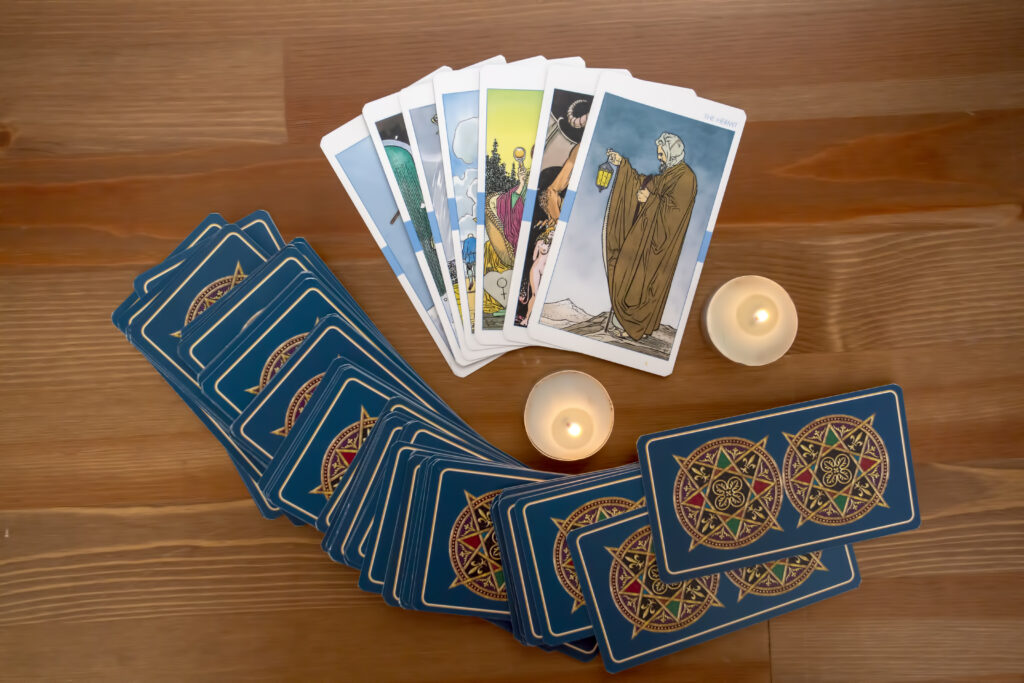When it comes to emotional healing, people are increasingly turning to unconventional yet deeply spiritual practices. Tarot, often misunderstood as merely a tool for divination, can actually serve as a profound method for self-reflection, emotional healing, and recovery from trauma. At its core, Tarot is about connection—connecting to your inner self, your intuition, and the healing energies within and around you. Let’s explore how Tarot can guide you through emotional trauma and help you discover new levels of self-awareness and growth.
Tarot as a Mirror for Self-Awareness
Emotional trauma often buries itself deep in the subconscious mind, manifesting in ways we don’t always recognize or understand. Tarot can act as a mirror, reflecting back the hidden emotions, beliefs, and patterns that contribute to our pain. Each card offers symbolic insight into our experiences, allowing us to gently bring unresolved issues to the surface in a safe and nurturing way.
For instance, pulling a card like The Tower may represent the emotional chaos and upheaval you’ve experienced, but it also reminds you that with destruction comes the opportunity for rebuilding. Similarly, The Star offers hope and renewal, symbolizing that healing and serenity are within reach after the storm. By engaging with these archetypes, you begin to make sense of your emotional landscape, understanding that healing is a process of integration, not avoidance.
A Tool for Processing Emotions
One of the most powerful aspects of Tarot is its ability to help us process emotions that we’ve either suppressed or struggled to articulate. Trauma can make us feel disconnected from our feelings, making it difficult to identify the root cause of our pain. Tarot readings create a space for you to engage with your emotions in a structured and meaningful way.
A spread such as the Celtic Cross or a Three-Card Past, Present, Future layout can guide you in seeing how past emotional wounds continue to affect your present and what you can do to move forward. It encourages you to confront these emotions, but from a place of self-compassion and curiosity rather than fear. Each card drawn offers an opportunity to ask important questions: What am I feeling? Why am I feeling this way? What can I learn from this experience?
Tarot and Intuition: Rebuilding Trust in Yourself
Emotional trauma often results in a loss of trust—both in others and in ourselves. We doubt our ability to navigate challenges and may feel disconnected from our own intuition. Tarot can be a powerful way to rebuild that trust. By regularly working with the cards, you strengthen your connection to your inner voice, learning to trust your interpretations and the messages you receive.
The High Priestess card, for example, symbolizes intuition, inner wisdom, and the unseen realms of the subconscious. When this card appears, it’s an invitation to reconnect with your inner knowing and trust the insights that arise, even when they challenge you. Over time, Tarot becomes less about seeking external guidance and more about tapping into your own wisdom.
Healing Through Reflection and Action
Healing from emotional trauma requires both reflection and action. Tarot provides the reflection—the insight into where you’ve been, where you are, and where you’re headed. But it can also guide you toward actionable steps for healing. A card like The Fool reminds you to embrace new beginnings and take bold steps forward, while The Hermit encourages you to withdraw and reflect when needed.
The key is understanding that Tarot isn’t just about receiving insight—it’s about using that insight to make empowered choices. If you pull a card that speaks to unresolved emotional wounds, it can serve as a catalyst for action, whether that’s journaling, seeking therapy, or setting boundaries with those who may have contributed to your pain.
Rituals and Intentions: A Sacred Healing Space
Incorporating Tarot into a personal healing ritual can be incredibly empowering. Create a sacred space where you can engage with your cards mindfully, setting intentions for your healing. Light candles, use crystals like amethyst or rose quartz, and practice deep breathing before beginning your reading. By turning your Tarot practice into a healing ritual, you invite in the energies of self-care and mindfulness, setting the tone for deep emotional work.
Consider pulling a daily card to check in with yourself or using specific Tarot spreads designed for emotional healing. The more intentional your practice, the more profound your healing journey will be.
A Journey to Self-Discovery
Healing emotional trauma is rarely a linear process, but Tarot offers a pathway to explore, process, and ultimately transform your wounds into wisdom. By working with the cards, you engage in a journey of self-discovery—one that allows you to see your trauma not as something that defines you, but as something that can be healed, integrated, and transformed.
At The School of Spiritual Healing Arts (SOSHA), we encourage a holistic approach to healing. Whether you’re new to Tarot or looking to deepen your practice, using Tarot as a tool for emotional healing can be a transformative part of your journey. It’s not just about reading the cards; it’s about reading your soul and reconnecting with your inner power.
If you’re ready to explore Tarot as a pathway to emotional healing, join us at SOSHA, where we offer in-depth training and guidance to help you become not just a skilled reader, but a powerful healer—of yourself and others.

